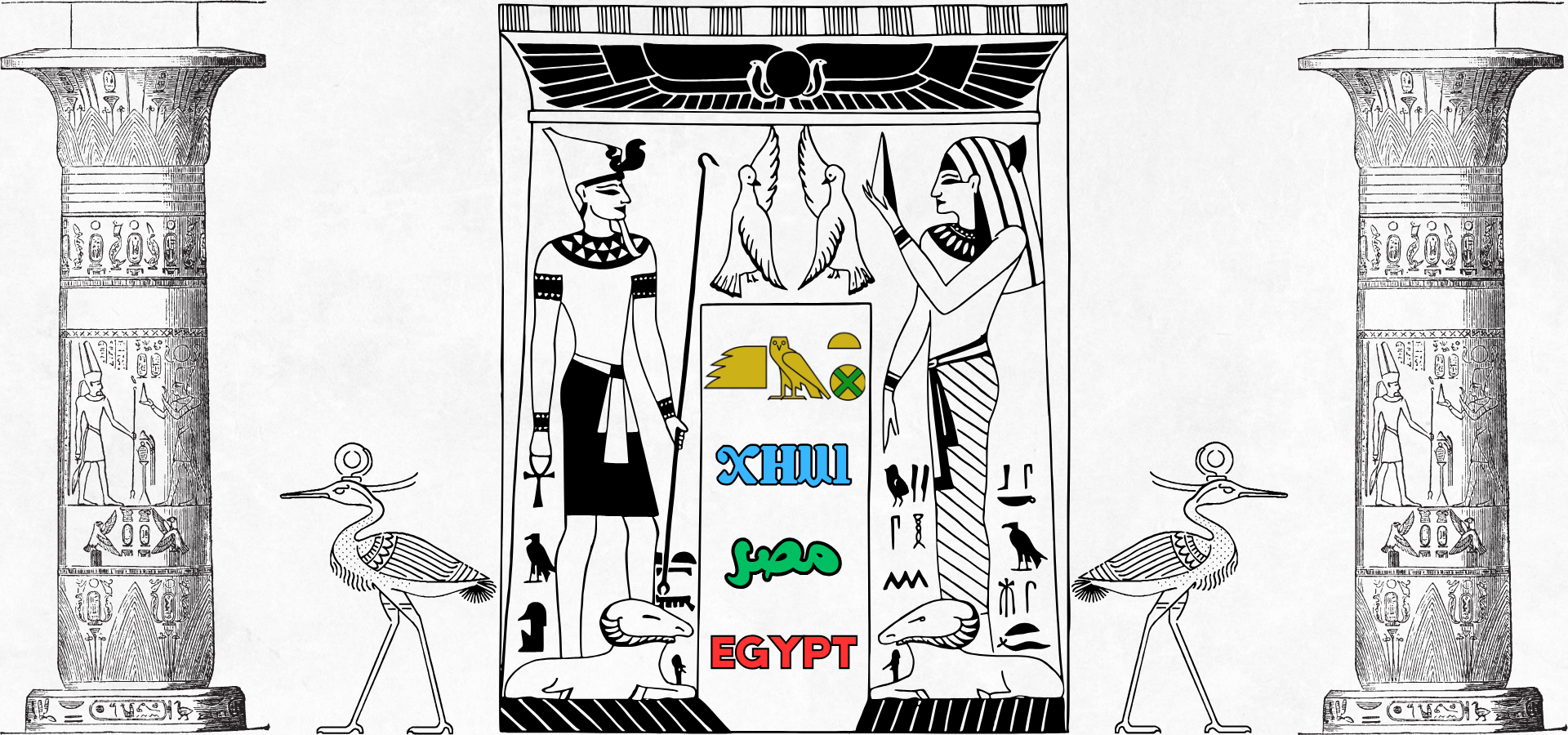


Hi there, friend. It’s me again, Setu, the scribe. I decided to be present during this… interesting reunion to explain a couple of things about the language you’re about to hear and read. You know, on account of it being lost to most. The language we used during my time (i.e., the time when Nefiri wrote her memoir) is what the people of your time refer to as Late Egyptian. The original scrolls Nefiri wrote are safe outside your realm, though some translations have survived. Of course, each translator added their own interpretation to the previous text. Still, despite these deviations, the spirit of the original scrolls lives on in every iteration of the text.
Now, the Egyptian language has evolved quite a bit since my time. Late Egyptian evolved into Demotic, and even that evolved into Coptic. The translation you are about to read is written in Coptic, more specifically in the Bohairic dialect. This, I’m afraid, is the closest you’re going to get to the original text. But thanks to the incredible work of my fellow scribe, Randy Komforty, you can both listen to and read Nefiri’s introduction in the Egyptian language and help keep the tongue of the people of Egypt alive. For that, we are all thankful!
You might also be wondering how I’m still here, thousands of years later. Well, that’s a long story for another day. But to give you a hint, read the epigraph I added to the beginning of Nefiri’s memoir. You might recognize my alias.


-
(C): ⲫⲙⲱⲓⲧ ⲛ̀ⲓ ⲉϧⲟⲩⲛ
(LT): Introduction
(ET): Introduction
(C): ⲟⲩⲟⲛⲧⲉ-ⲡⲕⲟⲥⲙⲟⲥ ⲙ̀ⲙⲁⲩ ⲛ̀ⲟⲩⲥⲁϫⲓ ⲛ̀ⲟⲩⲱⲧ ⲛ̀ⲁⲧⲫⲱⲛϩ:
(LT): The world has one unchanging thing:
(ET): The world has one unchanging constant:
(C): ϣⲁⲣⲉ-ⲣⲁⲙⲉⲥⲥⲏ ⲫⲛⲓϣϯ ⲱⲛϧ ⲉϣⲁⲩⲙⲟⲩ,
(LT): Ramesses the Great lives while we die,
(ET): Ramesses the Great lives while we die
(C): ⲟⲩⲟϩ ϣⲁⲣⲉ-ⲛⲉⲛⲯⲩⲭⲱⲟⲩⲓ ⲥⲓⲛⲓ ⲉⲃⲟⲗ ϧⲉⲛϩⲏ ϩⲁⲧⲏ,
(LT): and our souls pass from Huat to Duat,
(ET): and our souls pass from Huat to Duat
(C): ϫⲉⲭⲁⲥ ⲛ̀ⲧⲉ-ⲁⲛⲟⲩⲡ ϭⲓⲙⲱⲓⲧ ⲛⲱⲟⲩ,
(LT): so that Anubis guides them
(ET): to be guided by Anubis,
(C): ⲟⲩⲟϩ ⲛ̀ⲧⲉ-ⲙⲏⲓ ϯϩⲁⲡ ⲉⲣⲱⲟⲩ,
(LT): and Maat judges them
(ET): judged by Maat,
(C): ⲟⲩⲟϩ ⲛ̀ⲧⲉ-ⲟⲩⲥⲓⲣⲓ ⲁⲣⲉϩ ⲉⲣⲱⲟⲩ,
(LT): and Osiris guards them
(ET): guarded by Osiris,
(C): ⲟⲩⲟϩ ⲛ̀ⲧⲉ-ⲏⲥⲓ ⲙⲟⲩⲗϫ ⲙ̀ⲙⲱⲟⲩ.
(LT): and Isis embraces them.
(ET): and embraced by Isis.
(C): ⲛⲁⲓⲛⲏⲟⲩ ⲉⲃⲟⲗ ⲉϩⲣⲉⲛϩⲁⲛⲛⲟⲩϯ ⲉⲛⲁϣⲱⲟⲩ ϧⲉⲛⲡⲁⲁϩⲓ,
(LT): I have met numerous gods in my lifetime,
(ET): I've encountered many gods in my life.
(C): ⲟⲩⲟϩ ⲁⲓⲙⲓϣⲓ ⲛⲉⲙⲛⲏ ⲉⲧϩⲱⲟⲩ,
(LT): and fought those who are evil,
(ET): Fought the wicked
(C): ⲟⲩⲟϩ ⲁⲓⲉⲣϣⲫⲏⲣ ⲛⲉⲙⲛⲏ ⲉⲧⲥⲙⲁⲣⲱⲟⲩⲧ.
(LT): and befriended those who are blessed.
(ET): and befriended the noble.
(C): ⲁⲛⲟⲕ ϯⲥⲱⲟⲩⲛ ⲛ̀ⲛⲉⲛⲛⲟⲩϯ ⲕⲁⲧⲁⲛⲟⲩⲥⲙⲟⲧ ⲧⲏⲣⲟⲩ,
(LT): I know our gods by all their forms,
(ET): I know our deities in all their forms,
(C): ⲟⲩⲟϩ ⲓⲥ ⲣⲁⲙⲉⲥⲥⲏ ⲛ̀ϥϣⲟⲡ ⲁⲛ ⲛ̀ϧⲏⲧⲟⲩ, ⲕⲉⲡⲉⲣ ⲙⲟⲅⲓⲥ ⲉϥⲟⲛⲓ ⲙ̀ⲙⲱⲟⲩ.
(LT): and Ramesses isn't among them, though he nearly resembles them.
(ET): and Ramesses isn't one. He's very close, though.
(C): ⲥⲟⲩⲟⲛϩ ⲉⲣⲟⲓ ϫⲉ ⲁⲣⲏⲟⲩ ⲉⲕⲛⲁⲱϣ ⲙ̀ⲡⲉⲛⲥⲁϫⲓ ⲁⲛ.
(LT): It's apparent to me that perhaps you won't read our story.
(ET): I'm aware the chances are slim that you will read our story.
(C): ⲛⲁⲓⲟⲩⲱϣ ⲡⲉ ⲛ̀ϣⲟⲣⲡ ⲉⲉⲣⲓⲥⲧⲟⲣⲓⲍⲉ ⲛ̀ⲛⲉⲛⲙⲟϣⲓ ϧⲉⲛⲡϫⲓⲛⲑⲣⲉ-ⲡⲉⲛⲟⲩⲣⲟ ⲧⲟⲩϩⲟ ⲛⲉⲙⲛⲉϥⲓⲟϯ ϧⲉⲛⲧⲕⲟⲓ ⲛ̀ⲕⲁϣ.
(LT): I had originally wanted to document our journeys once our king has joined his ancestors in the Field of Reeds.
(ET): It had originally been my intention to document our adventures once our king joined his ancestors in the Field of Reeds.
(C): ⲁⲗⲗⲁ ϫⲉ ⲧⲉⲛⲛⲁϣⲱⲡⲓ ⲛⲉⲙⲛⲉⲛⲉⲣⲏⲟⲩ ⲛ̀ⲕⲉⲥⲟⲡ ⲛ̀ⲭⲱⲗⲉⲙ ϧⲉⲛⲡⲓⲱⲛϧ ⲉⲑⲛⲏⲟⲩ, ⲁⲛⲟⲕ ⲛⲉⲙⲡⲁⲙⲉⲛⲣⲓⲧ,
(LT): But since we will be with one another again soon in the life to come, I and my beloved
(ET): But, since I'll soon be reunited with my dear beloved in the afterlife
(C): ⲟⲩⲟϩ ⲛ̀ⲧⲉ-ⲡⲉⲛⲟⲩⲣⲟ ⲉⲣⲁⲩⲧⲟⲧϥ ⲉⲱⲛϧ ⲡⲁⲣⲁⲛⲉⲧϣⲉⲙϣⲓ ⲛⲁϥ,
(LT): and our king is determined to outlive those who serve him,
(ET): and our pharaoh is determined to outlive his subjects,
(C): ⲁⲛⲟⲕ ϩⲱ ⲛⲁⲧⲁⲙⲟⲕ ⲉⲩⲥⲁϫⲓ ⲉⲣⲉ-ⲡⲉⲕϫⲱⲟⲩ ⲛⲁϩⲉⲓ ⲉⲣⲟϥ ⲁⲛ ⲉⲛⲉϩ ϧⲉⲛⲛⲓϫⲱⲙ ⲛ̀ⲧⲉϥⲓⲥⲧⲟⲣⲓⲁ.
(LT): I will tell you a story your generation will never find in its history books.
(ET): I will share with you a story your generation will never find in its history books.
(C): ⲉϣⲱⲡ, ϧⲉⲛⲟⲩϣⲫⲏⲣⲓ,
(LT): If, by a miracle,
(ET): If, by a miracle,
(C): ⲟⲩⲓ ⲛ̀ⲧⲉⲛⲓⲥⲙⲟⲧ ⲉⲩⲥⲟⲃⲕ ⲉⲥⲛⲟϩⲉⲙ ⲙ̀ⲡⲓⲁⲙⲁϩⲓ ⲛ̀ⲣⲁⲙⲉⲥⲥⲏ ⲛⲁⲟⲩⲱϩ ϩⲓϫⲉⲛⲧⲉⲕϫⲓϫ,
(LT): one of the dwindling copies that escapes Ramesses' possession lands in your hand,
(ET): one of the few copies that escape Ramesses' grip lands in your hands,
(C): ⲉⲓⲟⲩⲱϣ ⲉⲑⲣⲉⲕϯϩⲑⲏⲕ,
(LT): I'd like you to be mindful,
(ET): I ask you to keep an open mind
(C): ϧⲉⲛⲡⲓⲙⲁ ⲉⲧⲉⲕⲭⲏ ⲛ̀ϧⲏⲧϥ ϧⲉⲛⲡⲁⲓⲕⲟⲥⲙⲟⲥ ⲉⲑⲟⲩⲟϣⲥ ⲉⲧⲉⲛⲟⲩⲏϩ ϩⲓϫⲱϥ,
(LT): wherever you are in this wide world in which we dwell,
(ET): wherever you may live in this vast world we inhabit,
(C): ⲟⲩⲟϩ ⲛ̀ⲧⲉⲕⲙⲟⲕⲙⲉⲕ ⲛ̀ⲛⲓⲕⲟⲥⲙⲟⲥ ⲉⲧⲁ-ϩⲁⲛⲟⲩⲟⲛ ⲛ̀ⲛⲓⲣⲱⲙⲓ ⲉⲧⲟⲛϧ ⲙ̀ⲙⲁⲩⲁⲧⲟⲩ ⲛⲁⲩ ⲉⲣⲱⲟⲩ ⲉⲛⲉϩ,
(LT): and consider the worlds which only a few living humans have ever seen,
(ET): and imagine the worlds only a handful of living humans have ever seen,
(C): ⲉⲧⲉⲛⲁⲓ ⲛⲉ ⲛⲓⲙⲁ ⲉⲧⲁⲓϣϭⲏⲣ ⲛ̀ϧⲏⲧⲟⲩ,
(LT): these being the places I have traveled,
(ET): where I've traveled
(C): ⲓⲧⲉ ⲉⲡⲓⲙⲁ ⲛ̀ⲧⲉⲛⲏ ⲉⲧⲟⲛϧ ⲓⲧⲉ ⲉⲡⲓⲙⲁ ⲛ̀ⲧⲉⲛⲏ ⲉⲑⲙⲱⲟⲩⲧ,
(LT): whether to the place of the living or to the place of the dead,
(ET): between the realms of the living and the dead,
(C): ⲉⲓϣⲓⲛⲓ ⲛ̀ⲥⲁⲛⲓⲁϩⲱⲣ ⲛ̀ⲭⲏⲙⲓ.
(LT): as I search for the treasures of Egypt.
(ET): in search of the treasures of Egypt.
(C):—ⲛⲉϥⲓⲣⲓ ⲙⲓⲛⲟⲩ, ⲑⲣⲉϥⲕⲱϯ ⲛ̀ⲥⲁⲁϩⲟⲣ
(LT): Nefiri Menu, Treasure Hunter
(ET): Nefiri Minu, the Treasure Hunter

-
ⲫⲙⲱⲓⲧ ⲛ̀ⲓ ⲉϧⲟⲩⲛ
ⲟⲩⲟⲛⲧⲉ-ⲡⲕⲟⲥⲙⲟⲥ ⲙ̀ⲙⲁⲩ ⲛ̀ⲟⲩⲥⲁϫⲓ ⲛ̀ⲟⲩⲱⲧ ⲛ̀ⲁⲧⲫⲱⲛϩ: ϣⲁⲣⲉ-ⲣⲁⲙⲉⲥⲥⲏ ⲫⲛⲓϣϯ ⲱⲛϧ ⲉϣⲁⲩⲙⲟⲩ, ⲟⲩⲟϩ ϣⲁⲣⲉ-ⲛⲉⲛⲯⲩⲭⲱⲟⲩⲓ ⲥⲓⲛⲓ ⲉⲃⲟⲗ ϧⲉⲛϩⲏ ϩⲁⲧⲏ, ϫⲉⲭⲁⲥ ⲛ̀ⲧⲉ-ⲁⲛⲟⲩⲡ ϭⲓⲙⲱⲓⲧ ⲛⲱⲟⲩ, ⲟⲩⲟϩ ⲛ̀ⲧⲉ-ⲙⲏⲓ ϯϩⲁⲡ ⲉⲣⲱⲟⲩ, ⲟⲩⲟϩ ⲛ̀ⲧⲉ-ⲟⲩⲥⲓⲣⲓ ⲁⲣⲉϩ ⲉⲣⲱⲟⲩ, ⲟⲩⲟϩ ⲛ̀ⲧⲉ-ⲏⲥⲓ ⲙⲟⲩⲗϫ ⲙ̀ⲙⲱⲟⲩ. ⲛⲁⲓⲛⲏⲟⲩ ⲉⲃⲟⲗ ⲉϩⲣⲉⲛϩⲁⲛⲛⲟⲩϯ ⲉⲛⲁϣⲱⲟⲩ ϧⲉⲛⲡⲁⲁϩⲓ, ⲟⲩⲟϩ ⲁⲓⲙⲓϣⲓ ⲛⲉⲙⲛⲏ ⲉⲧϩⲱⲟⲩ, ⲟⲩⲟϩ ⲁⲓⲉⲣϣⲫⲏⲣ ⲛⲉⲙⲛⲏ ⲉⲧⲥⲙⲁⲣⲱⲟⲩⲧ. ⲁⲛⲟⲕ ϯⲥⲱⲟⲩⲛ ⲛ̀ⲛⲉⲛⲛⲟⲩϯ ⲕⲁⲧⲁⲛⲟⲩⲥⲙⲟⲧ ⲧⲏⲣⲟⲩ, ⲟⲩⲟϩ ⲓⲥ ⲣⲁⲙⲉⲥⲥⲏ ⲛ̀ϥϣⲟⲡ ⲁⲛ ⲛ̀ϧⲏⲧⲟⲩ, ⲕⲉⲡⲉⲣ ⲙⲟⲅⲓⲥ ⲉϥⲟⲛⲓ ⲙ̀ⲙⲱⲟⲩ.
ⲥⲟⲩⲟⲛϩ ⲉⲣⲟⲓ ϫⲉ ⲁⲣⲏⲟⲩ ⲉⲕⲛⲁⲱϣ ⲙ̀ⲡⲉⲛⲥⲁϫⲓ ⲁⲛ. ⲛⲁⲓⲟⲩⲱϣ ⲡⲉ ⲛ̀ϣⲟⲣⲡ ⲉⲉⲣⲓⲥⲧⲟⲣⲓⲍⲉ ⲛ̀ⲛⲉⲛⲙⲟϣⲓ ϧⲉⲛⲡϫⲓⲛⲑⲣⲉ-ⲡⲉⲛⲟⲩⲣⲟ ⲧⲟⲩϩⲟ ⲛⲉⲙⲛⲉϥⲓⲟϯ ϧⲉⲛⲧⲕⲟⲓ ⲛ̀ⲕⲁϣ. ⲁⲗⲗⲁ ϫⲉ ⲧⲉⲛⲛⲁϣⲱⲡⲓ ⲛⲉⲙⲛⲉⲛⲉⲣⲏⲟⲩ ⲛ̀ⲕⲉⲥⲟⲡ ⲛ̀ⲭⲱⲗⲉⲙ ϧⲉⲛⲡⲓⲱⲛϧ ⲉⲑⲛⲏⲟⲩ, ⲁⲛⲟⲕ ⲛⲉⲙⲡⲁⲙⲉⲛⲣⲓⲧ, ⲟⲩⲟϩ ⲛ̀ⲧⲉ-ⲡⲉⲛⲟⲩⲣⲟ ⲉⲣⲁⲩⲧⲟⲧϥ ⲉⲱⲛϧ ⲡⲁⲣⲁⲛⲉⲧϣⲉⲙϣⲓ ⲛⲁϥ, ⲁⲛⲟⲕ ϩⲱ ⲛⲁⲧⲁⲙⲟⲕ ⲉⲩⲥⲁϫⲓ ⲉⲣⲉ-ⲡⲉⲕϫⲱⲟⲩ ⲛⲁϩⲉⲓ ⲉⲣⲟϥ ⲁⲛ ⲉⲛⲉϩ ϧⲉⲛⲛⲓϫⲱⲙ ⲛ̀ⲧⲉϥⲓⲥⲧⲟⲣⲓⲁ.
ⲉϣⲱⲡ, ϧⲉⲛⲟⲩϣⲫⲏⲣⲓ, ⲟⲩⲓ ⲛ̀ⲧⲉⲛⲓⲥⲙⲟⲧ ⲉⲩⲥⲟⲃⲕ ⲉⲥⲛⲟϩⲉⲙ ⲙ̀ⲡⲓⲁⲙⲁϩⲓ ⲛ̀ⲣⲁⲙⲉⲥⲥⲏ ⲛⲁⲟⲩⲱϩ ϩⲓϫⲉⲛⲧⲉⲕϫⲓϫ, ⲉⲓⲟⲩⲱϣ ⲉⲑⲣⲉⲕϯϩⲑⲏⲕ, ϧⲉⲛⲡⲓⲙⲁ ⲉⲧⲉⲕⲭⲏ ⲛ̀ϧⲏⲧϥ ϧⲉⲛⲡⲁⲓⲕⲟⲥⲙⲟⲥ ⲉⲑⲟⲩⲟϣⲥ ⲉⲧⲉⲛⲟⲩⲏϩ ϩⲓϫⲱϥ, ⲟⲩⲟϩ ⲛ̀ⲧⲉⲕⲙⲟⲕⲙⲉⲕ ⲛ̀ⲛⲓⲕⲟⲥⲙⲟⲥ ⲉⲧⲁ-ϩⲁⲛⲟⲩⲟⲛ ⲛ̀ⲛⲓⲣⲱⲙⲓ ⲉⲧⲟⲛϧ ⲙ̀ⲙⲁⲩⲁⲧⲟⲩ ⲛⲁⲩ ⲉⲣⲱⲟⲩ ⲉⲛⲉϩ, ⲉⲧⲉⲛⲁⲓ ⲛⲉ ⲛⲓⲙⲁ ⲉⲧⲁⲓϣϭⲏⲣ ⲛ̀ϧⲏⲧⲟⲩ, ⲓⲧⲉ ⲉⲡⲓⲙⲁ ⲛ̀ⲧⲉⲛⲏ ⲉⲧⲟⲛϧ ⲓⲧⲉ ⲉⲡⲓⲙⲁ ⲛ̀ⲧⲉⲛⲏ ⲉⲑⲙⲱⲟⲩⲧ, ⲉⲓϣⲓⲛⲓ ⲛ̀ⲥⲁⲛⲓⲁϩⲱⲣ ⲛ̀ⲭⲏⲙⲓ.
—ⲛⲉϥⲓⲣⲓ ⲙⲓⲛⲟⲩ, ⲑⲣⲉϥⲕⲱϯ ⲛ̀ⲥⲁⲁϩⲟⲣ

-
Introduction
The world has one unchanging thing: Ramesses the Great lives while we die, and our souls pass from Huat to Duat, so that Anubis guides them, and Maat judges them, and Osiris guards them, and Isis embraces them. I have met numerous gods in my lifetime, and fought those who are evil, and befriended those who are blessed. I know our gods by all their forms, and Ramesses isn't among them, though he nearly resembles them.
It's apparent to me that perhaps you won't read our story. I had originally wanted to document our journeys once our king has joined his ancestors in the Field of Reeds. But since we will be with one another again soon in the life to come—I and my Beloved—and our king is determined to outlive those who serve him, I will tell you a story your generation will never find in its history books.
If, by a miracle, one of the dwindling copies that escapes Ramesses' possession lands in your hand, I'd like you to be mindful, wherever you are in this wide world in which we dwell, and consider the worlds which only a few living humans have ever seen, these being the places I have traveled, whether to the place of the living or to the place of the dead, as I search for the treasures of Egypt.
—Nefiri Menu, Treasure Hunter

-
Introduction
The world has one unchanging constant: Ramesses the Great lives while we die, and our souls pass from Huat to Duat to be guided by Anubis, judged by Maat, guarded by Osiris, and embraced by Isis. I've encountered many gods in my life. Fought the wicked and befriended the noble. I know our deities in all their forms, and Ramesses isn't one. He's very close, though.
I'm aware the chances are slim that you will read our story. It had originally been my intention to document our adventures once our king joined his ancestors in the Field of Reeds. But, since I'll soon be reunited with my dear beloved in the afterlife and our pharaoh is determined to outlive his subjects, I will share with you a story your generation will never find in its history books.
If, by a miracle, one of the few copies that escape Ramesses' grip lands in your hands, wherever you may live in this vast world we inhabit, I ask you to keep an open mind and imagine the worlds only a handful of living humans have ever seen, where I've traveled between the realms of the living and the dead, in search of the treasures of Egypt.
—Nefiri Minu, the Treasure Hunter

Hi,
It's me, Amr Saleh, the author of Treasures of Egypt: The Spear & the Scythe. You might be here because you bought my book and wanted to check out the bonus content, or maybe you just stumbled upon this page while browsing the bottomless pit that is the internet. Don’t worry, I’m not judging you—been there, done that.
I just wanted to take a moment to thank Randy Komforty for translating the introduction of my book. I wrote Treasures of Egypt in an attempt to create the Egyptian fantasy story I wish I could’ve read growing up. I also wanted to include at least a part of the story in native Egyptian. Unfortunately, I only speak Egyptian-Arabic, and I almost gave up on the idea. That’s when Randy Komforty generously offered not only to translate the introduction but also to record himself reading it aloud. For that, he has my deepest gratitude.
If you do decide to use this text for personal or educational purposes, I ask you to give credit to Randy Komforty for his translation and to mention Treasures of Egypt: The Spear & the Scythe as the source of the original English text.
I hope that by making this original text available to everyone online, we can help keep the Egyptian language alive a little longer. Remember to keep speaking the names of the people mentioned on this page (Randy, Ramesses, Nefertari, Tuya, and Paser) so that they may live for a million years.
Thank you.









